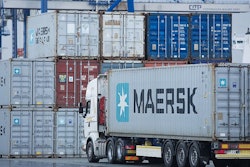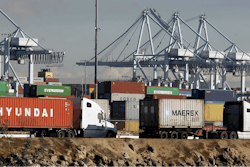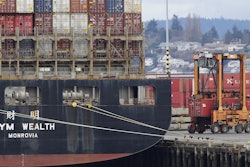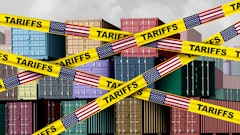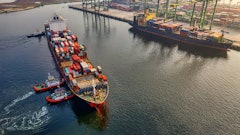
The Agriculture Transportation Coalition (ATC) has urged the Federal Maritime Commission (FMC) to compel ocean carriers to waive all charges imposed during the period of West Coast port congestion, roughly November 1, 2014 through April 15, 2015.
The AGT noted that Mario Cordero, chairman of FMC, heads to the Senate Commerce, Science, and Transportation Committee for a confirmation hearing today, which presents a timely opportunity for senators to ask him what the FMC is doing and should be doing to assist constituent U.S. exporters and importers who are being assessed grossly unfair and financially burdensome per diem container detention charges by the ocean carriers.
Chairman Thune (R-S.D.), Subcommittee Chair Fischer (R-Neb.), and Ranking Member Cantwell (D-Wash.) represent many agriculture exporters seeking effective Congressional oversight and immediate FMC action, the AGT noted.
Peter Friedmann, AGT executive director, stated: "The U.S. agriculture and forest products industries, the mainstay of our international trade exports, suffered billions of dollars of lost sales and revenue during the prolonged West Coast port disruption. Now, these same exporters are faced with millions of dollars of charges being imposed by ocean carriers, for delays which were most certainly not caused by the exporters. We urge Congress to encourage Chairman Cordero and the Commission to compel the ocean carriers to waive all per diem charges imposed during the period of West Coast port congestion, roughly November 1, 2014 through April 15, 2015."
West Coast marine terminals became extremely congested during the West Coast port labor contract negotiations, AGT noted. It was impossible for exporters and importers to return the ocean carriers' containers before the "free time" expired - typically four to 10 days. Terminals closed abruptly for hours or days at a time, and trucks could not get into the terminals to drop off their containers, creating gridlock that lasted for weeks and months. At times, railroads were forced to embargo shipments to the West Coast ports, as there was no place to unload.
Even though the ocean carriers were fully aware of this situation, they have churned out "per diem" charges, for failure of their customer to return the container on time. For some exporters and importers, the per diem fees are totaling hundreds of thousands and in some cases millions of dollars. These are costs that are being imposed following nine months of lost sales, cargo damage, lost customers and diverting cargo to air and to alternative gateway ports. As one observer noted, this is akin to renting a car at the airport, but when you try to return it, the car company has so congested the terminal that you can't get in - and then the car company charges you penalties for not returning the car on time! Some carriers are waiving these charges, but others are not.
Laura Daniels of ATC member Anderson Hay and Grain Co. Inc. elaborated: "Ocean carriers did much to create the problem, for instance they were not providing accurate information on when their vessels would arrive or depart, which created detention liability on our part when the marine terminals delayed receiving the containers we were trying to return. The carriers allowed the terminals to decide when and for how long they would accept containers for a sailing. Cut off dates for receiving cargo (and containers) were frequently delayed two or three weeks after we had taken the containers for loading, even though the carriers knew they were only giving us 14 days free time.
“Frequently, terminals only accepted containers back for a two or three day period, leaving trucks stranded in lines at the terminals all day long. Our trucking capacity was reduced by half just due to lines at the terminals, further inhibiting our ability to return containers. Carriers blamed labor and the terminals, while labor and the terminals blamed carriers. We, the exporter at the end of the chain, have been left holding the bag, trying to figure out what schedule our bookings would be on, what we might possibly be able to truck in order to keep our business running and our employees working. For all this, the carriers are imposing hundreds of thousands of dollars of per diem fees on the hay exporters here in the Pacific Northwest."
Friedmann added: "Carriers cannot, should not be allowed to profit by the congestion. We applaud those carriers which are responding to their customers' (the exporters and importers) requests for waiver of these unfair per diem fees; as the U.S. consumers of ocean transportation services, we look to the FMC and Congress to insist that all carriers waive these fees for shipments during the brutal West Coast port congestion."
The Commission has established a process through its Consumer Affairs and Dispute Resolution Service (CADRS), by which an individual exporter or importer can file a request for assistance. The shipper can then request the Commission to encourage the carrier to waive the per diem fee.
The FMC has also issued a report with suggested actions such as establishing an advisory committee, fact finding missions, or hosting listening sessions.





